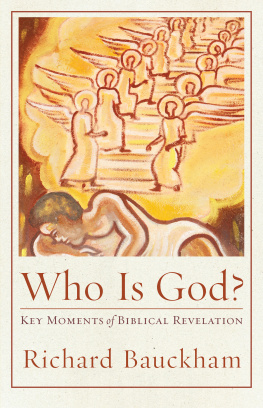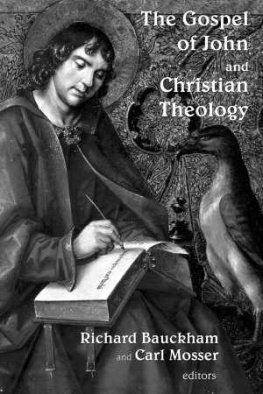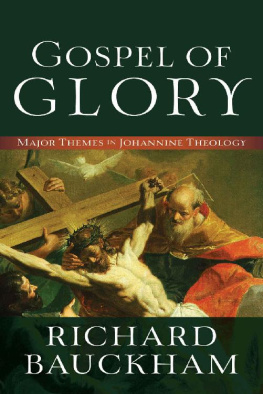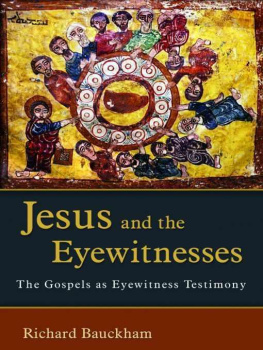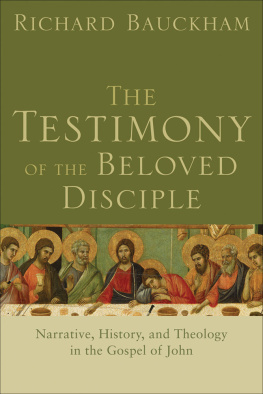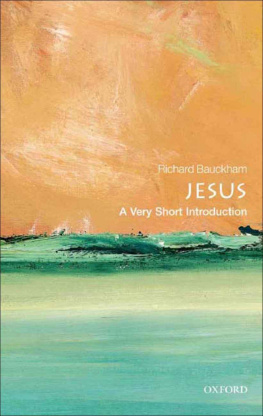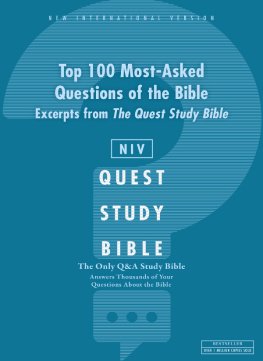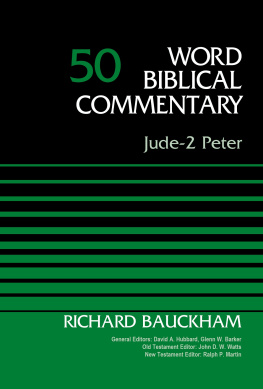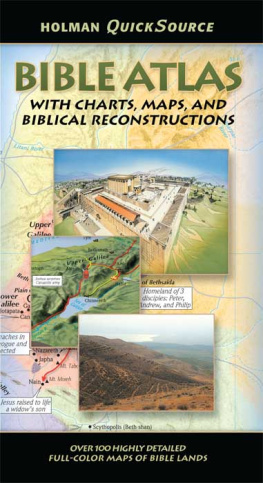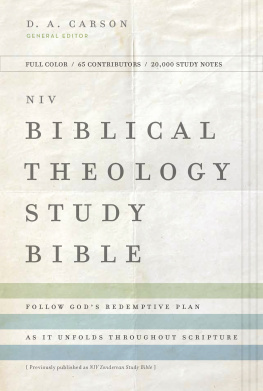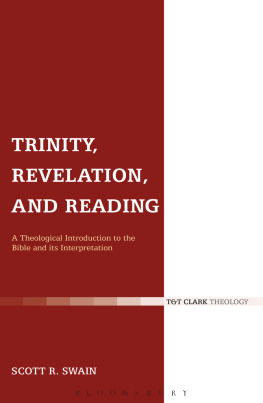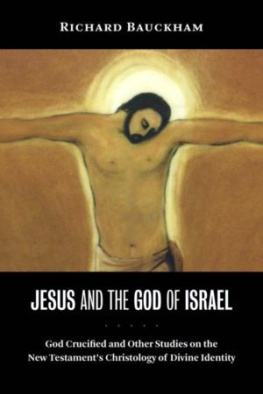Richard Bauckham - Who Is God?: Key Moments of Biblical Revelation
Here you can read online Richard Bauckham - Who Is God?: Key Moments of Biblical Revelation full text of the book (entire story) in english for free. Download pdf and epub, get meaning, cover and reviews about this ebook. year: 2020, publisher: Baker Publishing Group, genre: Religion. Description of the work, (preface) as well as reviews are available. Best literature library LitArk.com created for fans of good reading and offers a wide selection of genres:
Romance novel
Science fiction
Adventure
Detective
Science
History
Home and family
Prose
Art
Politics
Computer
Non-fiction
Religion
Business
Children
Humor
Choose a favorite category and find really read worthwhile books. Enjoy immersion in the world of imagination, feel the emotions of the characters or learn something new for yourself, make an fascinating discovery.
- Book:Who Is God?: Key Moments of Biblical Revelation
- Author:
- Publisher:Baker Publishing Group
- Genre:
- Year:2020
- Rating:5 / 5
- Favourites:Add to favourites
- Your mark:
- 100
- 1
- 2
- 3
- 4
- 5
Who Is God?: Key Moments of Biblical Revelation: summary, description and annotation
We offer to read an annotation, description, summary or preface (depends on what the author of the book "Who Is God?: Key Moments of Biblical Revelation" wrote himself). If you haven't found the necessary information about the book — write in the comments, we will try to find it.
Who Is God?: Key Moments of Biblical Revelation — read online for free the complete book (whole text) full work
Below is the text of the book, divided by pages. System saving the place of the last page read, allows you to conveniently read the book "Who Is God?: Key Moments of Biblical Revelation" online for free, without having to search again every time where you left off. Put a bookmark, and you can go to the page where you finished reading at any time.
Font size:
Interval:
Bookmark:
Acadia Studies in Bible and Theology
H. Daniel Zacharias, General Editor
The last several decades have witnessed dramatic developments in biblical and theological study. Full-time academics can scarcely keep up with fresh discoveries, ongoing archaeological work, new exegetical proposals, experiments in methods and hermeneutics, the rise of majority world theology, and innovative theological proposals and syntheses. For students and nonspecialists, these developments can be confusing and daunting. What has been needed is a series of succinct studies that assess these issues and present their findings in a way that students, pastors, laity, and nonspecialists will find accessible and rewarding. Acadia Studies in Bible and Theology, sponsored by Acadia Divinity College in Wolfville, Nova Scotia, and in conjunction with the colleges Hayward Lectureship, constitutes such a series.
The Hayward Lectureship has brought to Acadia many distinguished scholars of Bible and theology, such as Sir Robin Barbour, James D. G. Dunn, C. Stephen Evans, Edith Humphrey, Leander Keck, Helmut Koester, Richard Longenecker, Martin Marty, Jaroslav Pelikan, John Webster, Randy Woodley, and N. T. Wright. Initiated by Lee M. McDonald and Craig A. Evans, the Acadia Studies in Bible and Theology series continues to reflect this rich heritage and foundation.
These studies are designed to guide readers through the ever more complicated maze of critical, interpretative, and theological discussion taking place today. But these studies are not introductory in nature; nor are they mere surveys. Authored by leading authorities in the field, the Acadia Studies in Bible and Theology series offers critical assessments of major issues that the church faces in the twenty-first century. Readers will gain the requisite orientation and fresh understanding of the important issues that will enable them to take part meaningfully in discussion and debate.
2020 by Richard Bauckham
Published by Baker Academic
a division of Baker Publishing Group
PO Box 6287, Grand Rapids, MI 49516-6287
www.bakeracademic.com
Ebook edition created 2020
Ebook corrections 11.11.2020
All rights reserved. No part of this publication may be reproduced, stored in a retrieval system, or transmitted in any form or by any meansfor example, electronic, photocopy, recordingwithout the prior written permission of the publisher. The only exception is brief quotations in printed reviews.
Library of Congress Cataloging-in-Publication Data is on file at the Library of Congress, Washington, DC.
ISBN 978-1-4934-2383-5
Unless otherwise noted, Scripture quotations are from the New Revised Standard Version of the Bible, copyright 1989 National Council of the Churches of Christ in the United States of America. Used by permission. All rights reserved.
Scripture quotations labeled NIV are from the Holy Bible, New International Version. NIV. Copyright 1973, 1978, 1984, 2011 by Biblica, Inc. Used by permission of Zondervan. All rights reserved worldwide. www.zondervan.com. The NIV and New International Version are trademarks registered in the United States Patent and Trademark Office by Biblica, Inc.
Scripture quotations labeled REB are from the Revised English Bible, copyright Cambridge University Press and Oxford University Press 1989. All rights reserved.
Cover
Half Title Page
Series Page
Title Page
Copyright Page
Preface
Introduction
1. The Revelation of the Divine Presence
2. The Revelation of the Divine Name
3. The Revelation of the Divine Character
4. The Revelation of the Trinity
Scripture and Ancient Writings Index
Cover Flaps
Back Cover
The origins of this book lie in three lectures that I gave twice, first as the Frumentius Lectures for 2015 at the Ethiopian Graduate School of Theology in Addis Ababa and second as the Hayward Lectures for 2018 at Acadia Divinity College in Nova Scotia, Canada. The lectures formed the basis for chapters 2, 3, and 4 of this book, for which purpose they were revised and somewhat expanded. Chapter 1 has been written de novo for this book.
I am grateful to those who invited me to give the two lecture series, as well as to those who in both places made me very welcome, formed enthusiastic audiences, and asked thoughtful and probing questions.
Because the book originated as lectures, I have not provided footnotes with references to the secondary literature. The footnotes are limited to biblical references and brief explanatory notes. But at the end of each chapter I have provided bibliographic notes, indicating some of the more important and helpful published work on the subjects of that chapter. Of course, because the chapters range widely over biblical passages and themes, I could have extended the bibliography indefinitely. I decided not to list commentaries because there are so many good commentaries and readers can more easily find them for themselves.
In our ever more secular age many people pose the question Does God exist? or Is there a God? But to consider this question seriously we must also ask the question Who is God? The content that people give to the word god has varied and still varies enormously, and so one has to ask, What kind of God are you actually talking about? What God? or Who is God? In biblical times this was the obvious question. Very few people thought there was nothing to which one could apply the term god or the gods or the divine. But which god was truly God? Who is the God you are talking about? This was the key question and I think still is.
Even though all notions of the divine have something in common, and some more than others, Christians give priority to those key events and experiences that the Bible relates and expounds as the revelation of God. We can answer the question Who is God? only by attending to who God has revealed himself to be. To this the whole biblical revelation is relevant. Asked what the whole Bible is about, I would say it is most centrally about the identity of God, while at the same time it tells the story of God and his creation, that all-encompassing story that extends from creation in the beginning to new creation at the end. Intensively the Bible is about the identity of God; extensively it tells the story of God and the world.
Within that all-encompassing story, there are key moments of revelation that could be said to define who God is for usor, it would be better to say, moments in which God defines who God is for us. These are not merely moments that are narrated once within the biblical story; they are more like reference points to which the rest of Scripture constantly refers back. They are moments that reverberate through the whole story. Moreover, like all events of great significance, their significance is not grasped all at once and forever. They are moments whose meaning is never exhausted. So we should read them as events pregnant with meaning, pointing us finite creatures of God to Gods inexhaustible and mysterious identity. They should challenge our own understanding of God and our own relationship with God, for, as J. B. Phillips famously said, Your God is too small.
The key moments of divine disclosure we shall reflect on in this book are by no means the only such moments in the Bible. Others could have been chosen. But those we consider here are undoubtedly among the most significant. They are Jacobs dream at Bethel (Gen. 28:1022), the revelation to Moses at the burning bush (Exod. 3), the revelation to Moses on Mount Sinai (Exod. 33:1734:8), and the three key moments of revelation in the Gospel of Mark (1:911; 9:28; 15:3739). In all these cases our exploration of biblical theology will range more widely than these moments of disclosure themselves, but they will be our guiding stars by which to travel through related territory.
Font size:
Interval:
Bookmark:
Similar books «Who Is God?: Key Moments of Biblical Revelation»
Look at similar books to Who Is God?: Key Moments of Biblical Revelation. We have selected literature similar in name and meaning in the hope of providing readers with more options to find new, interesting, not yet read works.
Discussion, reviews of the book Who Is God?: Key Moments of Biblical Revelation and just readers' own opinions. Leave your comments, write what you think about the work, its meaning or the main characters. Specify what exactly you liked and what you didn't like, and why you think so.

